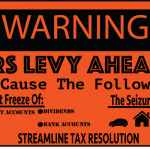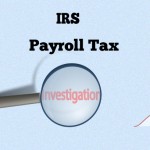Craig Thomas
Latest posts by Craig Thomas (see all)
- Chris Feels Victorious - September 8, 2016
- Are You At Risk of a Levy? - May 26, 2016
- 3 Ways To Survive Your Spouse’s Tax Troubles - February 15, 2016
If you don’t pay your taxes (or make arrangements to settle your debt), the IRS may seize and sell any type of real or personal property that you own, or have an interest in.
One of the first things the Taxman will target is your bank account(s). This is achieved by sending a Notice of Levy to your bank. They do not need to specify the account number. They simply inform your financial institution that it has been ordered to remit all funds for which the taxpayer has an unrestricted right to withdraw funds (signature authority), as of the date of the notice, directly to the IRS in 21 days up to the amount owed, as indicated on the notice. By law, your bank is required to comply with this order. Any funds you deposit after the date of the levy notice will not be affected, and will be available for use as in any normal situation. However, if the amount demanded exceeds the balance in your account(s) as of the date of the letter, the IRS may send a second Notice of Levy to your bank at any time, but typically after 30 days.
This IRS will prevent the bank from honoring automatic payments, such as for your mortgage, car lease, loan repayments, insurance remittances, etc.
The IRS may agree to withdraw the Notice of Levy if you come to suitable payment terms with them, likely for the full amount outstanding, or if you can show that you are in a financial hardship situation. If so, then your bank account will return to “normal”.
Note: Unfortunately, the IRS is in a position to dictate how much money they must receive before they withdraw the levy order. The amount you owe to the IRS, as shown on the Notice of Levy letter, may not represent the full amount of taxes you owe for a couple of reasons. Since interest and penalties are accrued daily, and/or new assessments may be added to your balance between the time the IRS letter is issued and the time you come to payment terms with the IRS, your balance owed may have increased. Additionally, the IRS may send levy notices for “a particular tax period”, and not ALL the tax periods with a balance owed, due to timing differences of each tax period’s collection cycle. It’s in your best interest to know exactly how much you owe.
A Certified Tax Resolution Specialist can assist you in resolving your issues with the IRS to release levies on your bank account(s), so if you find yourself in a predicament like this, get help fast.







